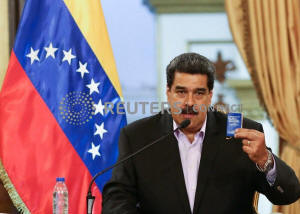|
U.S. sanctions threaten Venezuela's
economy as Maduro eyes next move
 Send a link to a friend
Send a link to a friend
 [January 29, 2019]
By Mayela Armas and Deisy Buitrago [January 29, 2019]
By Mayela Armas and Deisy Buitrago
CARACAS (Reuters) - Venezuelans braced for
the deepening of a brutal economic crisis on Tuesday after the United
States imposed sanctions sharply curbing the country's vital oil
exports, while the socialist government responded by refusing to load
crude cargoes without payment.
The Trump administration hopes the sanctions, which bar state-owned oil
company Petroleos de Venezuela from collecting proceeds from crude sales
to U.S. refineries, pressure President Nicolas Maduro to step down and
allow opposition leader and self-proclaimed president Juan Guaido to
call elections.
In a defiant national broadcast on Monday night, Maduro said he would
take legal action to challenge the sanctions and defend Citgo Petroleum
Corp, PDVSA's U.S. refining subsidiary, which he accused the United
States of trying to steal. He also pledged to retaliate, but did not
announce any specific measures.
"We will provide the reciprocal and convincing response needed to defend
Venezuela's interests in due time," Maduro said.

PDVSA responded to the sanctions by ordering customers with tankers
waiting to load crude destined for the United States to prepay,
according to three sources with knowledge of the decision. Such
prepayment could be in violation of the sanctions, setting the stage for
a standoff at the ports.
The loss of revenue from the United States, the No. 1 buyer of
Venezuelan crude, was sure to further hamper the government's ability to
import basic goods like food and medicine, exacerbating a humanitarian
crisis that has prompted more than 3 million people to flee the
hyperinflation-stricken country in recent years.
"If you do not find a place for that crude quickly, the room for
maneuver will shrink and imports will be affected," said Asdrubal
Oliveros, director of Caracas-based consultancy Ecoanalitica.
[to top of second column]
|

Venezuela's President Nicolas Maduro holds a copy of the Venezuelan
constitution while he speaks during a meeting with members of the
Venezuelan diplomatic corp after their arrival from the United
States, at the Miraflores Palace in Caracas, Venezuela January 28,
2019. Miraflores Palace/Handout via REUTERS

Guaido, who argues that Maduro usurped the presidency on taking
office for a second six-year term on Jan. 10 following a May 2018
election considered fraudulent by the opposition, has said he is
prepared to receive $20 million in humanitarian aid pledged by the
United States.
He also moved to set up new boards of directors for Citgo and PDVSA,
which could allow his parallel government to collect money held in
escrow accounts in the United States.
But to truly control state functions, he would need the support of
the military. It has so far stood by Maduro, who has kept officers'
support in part by granting them control of key state institutions
like PDVSA, although the company's output has collapsed in just over
a year of military rule.
The sanctions threatened to hasten PDVSA's unraveling.
"There is total shock. This company is already too beat-down," a
high-level manager said on Monday on condition of anonymity.
(Reporting by Mayela Armas and Deisy Buitrago; Writing by Luc Cohen;
Editing by Peter Cooney)
[© 2019 Thomson Reuters. All rights
reserved.]
Copyright 2019 Reuters. All rights reserved. This material may not be published,
broadcast, rewritten or redistributed.
Thompson Reuters is solely responsible for this content.
 |